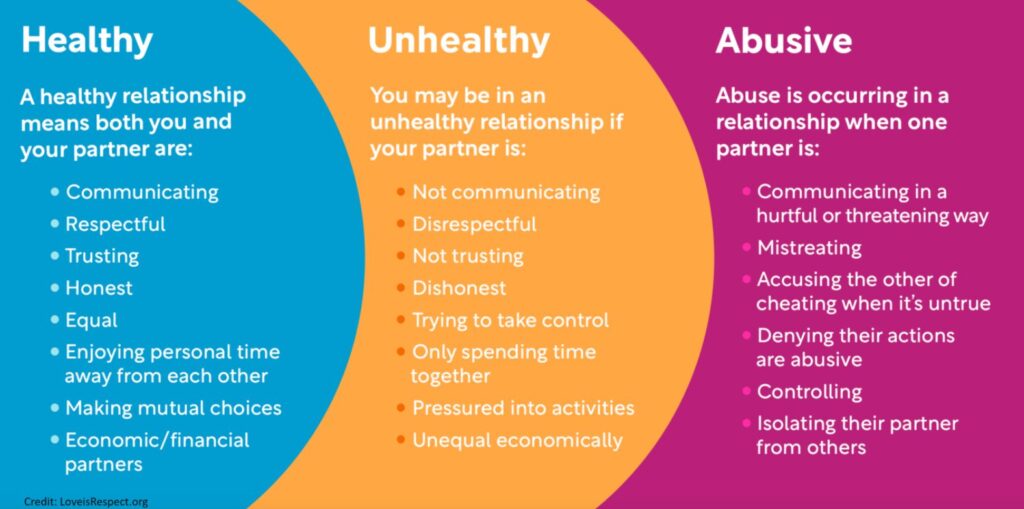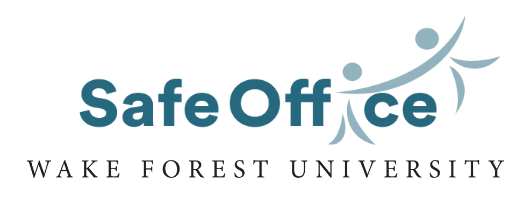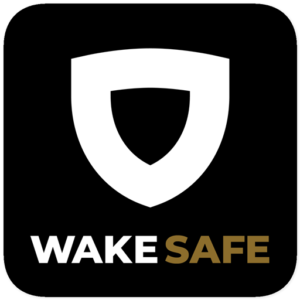Relationships
It is exciting to be in relationship with other people, and your experience at our university will be full of opportunities to meet new people and develop relationships…some of which may become romantic and/or intimate. It can be challenging sometimes to gauge how healthy our relationship might be for a variety of reasons, including modeling from our own family system, community, or society, your own belief systems around relationships, manipulation from an abusive partner, toxic influences from social media, and peer pressure.
Understanding the Relationship Spectrum can be a helpful tool to start to examine the characteristics of our relationships and where they may be falling on the spectrum.

LoveIsRespect.org also has other great tools to learn more about the inner workings of relationships, including:
- A quiz to determine if your relationship is healthy
- Dating 101
- Intimate relationships
- Understanding consent
- Warning signs of abuse
Know the Flags
What are some warning signs of an unhealthy relationship? Click below to learn more about warning signs
- Want to move too quickly in relationship
- Create a sense of “too good to be true” very early in relationship
- Isolate you from family, friends, community, activities, work, school, etc.
- Not honor your boundaries
- Display jealousy, insecurities, and/or accused you of being unfaithful with no reason
- Excessively monitor your location and/or digital communication
- Criticize, put you down, and/or frequently use shame based language
- Take little to no ownership of their own behaviors and/or gaslight you
- Control, misuse, abuse, or isolate you financially
- Have a history of abusing others
- Have frequent explosive or impulsive outbursts, temper, or mood swings
- Make threats of harm towards themself due to aspects of the relationship
- Blame previous relationship(s) failures entirely on the other person
- Make direct disclosures of past relationship violence
- Ignore consent
- Make excessive calls, emails, DMS, and/or texts
- Limit contraception options or refuses safe sex practices
- Blaming abuse on LGBTQ identity
- Denying LGBTQ abuse exists or normalizing abuse in LGBTQ community
- Pressuring partner to be “out” or “closeted”
- Targeting genitals or chest for physical abuse
- Denying partner access to gender affirming care
- Not allowing partner to heal from gender affirming surgeries
- Public displays of affection in dangerous (anti-LGBTQ) spaces
- Using LGBTQ stereotypes to coerce partner for sex acts
- Using gender roles to control how a partner has sex
- Using words for a partner’s anatomy that do not align with their gender identity
- Forcing sex in exchange for basic needs (such as food, housing, etc.)
- Not practicing safe sex practices / minimizing need due to misinformation on LGBTQ sex
- Isolating partner from LGBTQ community / supports / events
- Being excessively dramatic at LGBTQ events
- Weaponizing LGBTQ discrimination or bi/trans/homophobia to justify an “us vs. them” mentality or encourage isolation
- Denying a partner’s LGBTQ identity
- Controlling how a partner expresses their gender / sexual orientation
- Intentionally using incorrect pronouns / deadnaming
- Threatening to out a partner at work
- Identity theft (easier when partner is same gender)
- Demanding a partner pay for gender-affirming care
- Using gender roles as a justification for financial exploitation

Need to leave the website quickly?
Safe Office
Need immediate assistance?
24/7 Confidential Support Line
Have a non-urgent question?
Visit Us!
Wake Safe App

- Mobile BlueLight: send your location to and call WFU PD simultaneously.
- Friend Walk: sends your location in real-time to a friend so they can watch you as you walk to your destination!
- Social Escape: allows you to get out of a tough social situation by calling you and giving you an excuse to leave.
- We Are Wake: a comprehensive call to care for the mental health of all students.
- Campus Support Resources
